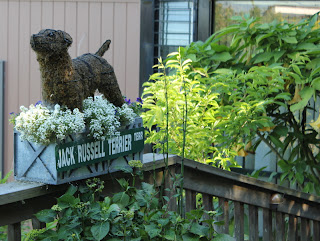At this time last week, I was eating breakfast at Tyger’s (the
California Scramble: eggs, avocado, mushrooms, cheese and tomatoes—yum!) and reluctantly planning our final day in San Francisco .
Laure Ferlita and I made the trek cross country to gather material for articles and scout subjects for a
new online art class. It's a dirty job, but someone has to do it!
Even though I was born and raised in California ,
I’d never been to San Francisco for
longer than an overnight stay with my sister-in-law about 15 years ago. I
remember nothing about the city, except that we ate at an amazing restaurant
where the chef cooked up some French fries (not on the menu) for my 2-year-old
son so he’d have something to eat while the rest of us indulged in more
grown-up cuisine.
I did some research beforehand, trying to make sense of the
different neighborhoods (Russian Hill, Telegraph Hill, Haight-Ashbury ,
etc.) and how they fit together. The online travel boards agreed that having a
car wasn’t necessary, that public transportation was readily available and reasonably
priced, while parking and driving were headaches.
Well, yes and no. And yes. Public transport was available,
but the size of the city made it difficult to get from location to location
quickly—and while there is plenty of public transport, sometimes it’s a bit
confusing to figure out which method will get you where you want to go (street
car, cable car, bus or metro?) and how many hills you’ll have to climb in the
meantime. (Being from flat Florida ,
we found even those hills described as having “gentle inclines” taxing to the
cardiovascular system.)
We’d planned to rent a car for part of the visit anyway,
hoping to get out of the city to Muir Woods or Point Reyes ,
and by the time we picked it up, we were ready to brave the traffic of San
Francisco in order to see more in less time. The
traffic was indeed headache-inducing and so was parking, but we managed. And
no, we did not drive Lombard Street
(known as the world’s crookedest street) but we did take pictures of the
foolhardy brave folks who did. I did the driving and Laure the navigating, and
I could not have done it without her. She also made a fine coach through what
seemed to be constant parallel parking.
Even with the car, we still averaged around 10,000 steps a
day, logging more than 16,000 on our busiest day. Some of the things we saw included (click to enlarge photos):
Fortune cookies being made at the Golden Gate Fortune Cookie Company:
You can bring your own fortunes to be inserted into the cookies. We just bought a bag of already-assembled cookies. My fortune said, “Opportunity awaits you next Tuesday.” That was last Tuesday. I'm still waiting.
Brown velvet sea lions at Pier 39:
 |
| Life is good. |
Japanese Tea Garden (located in Golden Gate Park):
 |
| They are not kidding. See below: |
This garden has a real aura of
peace and tranquility even if it’s busy with visitors. I'd come back here.
San Francisco Botanical Gardens (also located in Golden Gate Park), beautiful flowers and friendly squirrels:
Coit Tower/Fillbert Steps:
For some reason, the murals at Coit Tower, located on Telegraph Hill, charmed me. They were part of the Public Works of Art Project (under the New Deal) and are mostly done in fresco, according to Wikipedia.
 |
| "Old Man Weather" |
Views from the hill are pretty spectacular:
Just steps away from Coit
Tower
 |
| Wouldn't this make a wonderful place to write or paint? |
Hope you’ll return Friday for part two of the San
Francisco travelogue! We felt like we barely scratched
the surface of what there was to see in the city. Have you ever been to San
Francisco? W hat are your favorite memories?
*Not really—the battery just wore out!




































